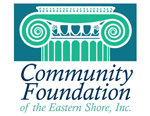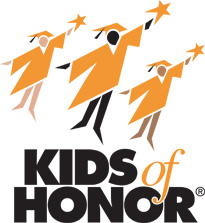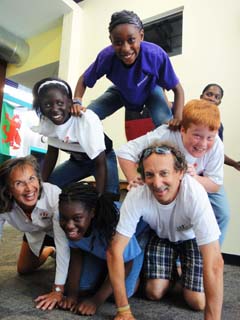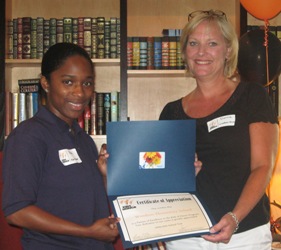|
Kids of Honor® Partner Sites 2011/2012 Year:
First Annual Partner of Excellence Award -- June 2009
It's a joy to work with our Partners of Excellence: Prince Street Elementary School STEP Team Our community partners include: Bus services from Mr. Barkely and Mr. Handy CHOICES, Joe Gast Main Street Gym & Frenando Guerrero Our Local Universities:
DEF and WMDT- 47 TV Publicize Local Scholarships The Delmarva Education Foundation (DEF) and WMDT-47 television is again partnering to showcase scholarships available specifically for local residents. “Meet the Money Givers” is a series of short video segments that will air on WMDT’s news programs from January through April and then be available on DEF’s website. Each segment will describe a different scholarship, including the history, purpose, and requirements of that award. “The series helps people find money to continue their education,” said Katherine Harting, DEF’s executive director, adding, “It’s timely because January through April is prime scholarship search time for September enrollment, and the early bird catches the worm in college financial aid awards.” Each segment will air on all three of WMDT-47’s local newscasts two days a week (one segment on Wednesday, another on Saturday). WMDT will also air the segments in a similar pattern on channel CW3. WMDT news anchor Terrence Lee hosts the series, which is designed to recognize the people who support with their time and money the educational aspirations of local students. “This is a remarkably generous community, and this series helps make the connection between those who need scholarship money and those who have money to give,” said WMDT’s general manager, Kathleen McLain. She noted, “Running a scholarship program is work, and promoting it is even more work. That’s where WMDT and DEF can help.” (In “a previous life,” Ms. McLain was a teacher and guidance counselor.) The “Meet the Money Givers” partnership between DEF and WMDT, which began early in 2010 with a 28-part series, grew from a shared recognition that scholarship sponsors are too often frustrated by a lack of applicants, even while a lack of funds frustrates potential students. Applicants may want to note that last year’s series remains accessible from DEF’s website at www.delmarvaed.org. DEF is a local 501(c)(3) nonprofit organization based in Salisbury whose mission is to improve college access and success for residents on the lower Delmarva Peninsula. Its free, searchable, online database contains information on more than 500 local-priority scholarships totaling well over a million dollars. Assistance on a wide range of topics relating to post-secondary education is available for individuals, families, and groups from DEF’s trained college access advisors. For more about DEF, see www.delmarvaed.org. WMDT 47, headquartered in Salisbury, premiered its first television broadcast in 1980. It is one of the few privately owned stations in the country. The station has a long and impressive record of service to the community, sponsoring and supporting a large number of locally important events as well as offering internships to local students. In 2004, the station received the coveted “Service to America” award for its service to children by the National Association of Broadcasters. Always an annual winner of news and production awards, in 2006 the Station was recognized, among other awards, as having the “Best Newscast on Delmarva” by the Chesapeake Association of Broadcasters.
Parents are our Partners... Here are some tips: Parenting Teens -- Are We Having Fun Yet? by Keith Pattinson The instructions given me were simple: "Write 2,000 words about parents and teens in trouble." No shortage of raw material there. I took a bit of time and I reread The book authored by Drs. Robert and Jean Bayard entitled…. “ How to Deal With Your Acting –Up Teenager” and was reminded of their admission they’d acquired as much from their experience raising five children as from the PhD’s in Psychology they both possess. Their ideas are the foundation of the British Columbia-wide Parents Together program, which today offers self-help support to over 500 parents who attend weekly meetings held in 26 communities throughout our province. If you could place yourself among the 10-to-40 parents of acting-up teens who gather at a Parents Together Orientation, you might, like them, be amazed to look around and find that everyone sitting in the room looks so normal. Of course, that is because they are, but we have been told time and again by parents that they have come to believe they are less worthy, less normal, and that there must be something wrong with them. You see, unresolved parent/teen conflict can do that to you. It is an esteem and confidence-destroying activity that is so insidious you don't realize you have fallen into the trap of believing that you are the one who is responsible for controlling your teen's behavior. So what does a parent do when they are dealing with a teen that is rude, dishonest and abusive? Or one who skips school, steals, or keeps the family on the ropes by running away or threatening to run away? What happens to parents who find themselves in these circumstances unequipped or unable to break the cycle? First and foremost, they have told us by the hundreds that they are embarrassed, angry and disappointed. They feel confused and powerless and a failure in fulfilling their roles as parents. Some tell us they have become so discouraged and felt so hopeless they wish they could run away. A single mother of three teens said it for most of the parents we have talked to when she described the tremendous isolation from friends, relatives, and neighbors she felt as a result of the behavior of her teens. One mom told us the best thing that happened in her community was the opening of a 24-hour major grocery store. It meant she could go shopping at 2:00 in the morning and not have to explain to any of her neighbors what was going on between her and her kids. And, a dad of an acting-up teen, told us he sometimes felt that his primary role in life was to serve as a warning to other parents. So, how do you begin to turn things around? For starters, talk to your spouse or partner. If you are alone, seek out a trusted friend, neighbor, or relative and tell them you want to bring about change in the relationship between you and your acting-up teen. Tell your teen the same thing. Do it positively. Don't attach blame. Don't feel compelled to offer detail. A little suspense goes a long way, and anyway, you have not formulated how you are going to proceed, just that you are. Accept that you cannot change your teen's behavior. You can only change the way in which you react to that behavior. And when you do, your teen will be compelled to alter their conduct. Tell yourself and anyone who will listen without judging that you will do whatever it takes to bring harmony, respect, and honesty into the relationship between you and your teen. Then accept that you cannot change your teen's behavior. You can only change the way in which you react to that behavior. And when you do, your teen will be compelled to alter their conduct. It can be a tricky concept and a difficult one to accept in the midst of teen rebellion. But think about it. When was the last time someone changed your behavior? Next, make a list of all the things you dislike about your teen's conduct or attitude. This is your chance to really go for it, so your list could cover the range from a messy bedroom to emotional, verbal, and physical abuse. If you are sharing teen raising with a partner, be sure they complete a list of their own. Frequently, we have found situations where two parents comparing lists discovered for the first time they were reacting to and dealing with different issues rather than presenting their teen with consistent and prioritized responses and support. Having made the list, it is time to remind yourself again of your determination that you can't change someone else's behavior. You will have to do this often because you are coming to the toughest task you will face. It helps to get the support of someone who has done it successfully, someone who has fought their way through the whole process of "taking a stand' and 'backing off" and speaks from experience. The first step is to take your list of 10 or 50 items and separate them into two columns. On the left side of the page, put the heading "Kid's-Life List" and place under this, those problems which you have no control over or problems that have consequences that affect only your teen. On the right side, put a heading "Parent's-Life List" and under this put those problems that you do have control over or problems having consequences that affect your life directly. As you work your way through this task, you will realize it is not always a black and white situation, that things which more directly affect teens can often have an influence on parents' lives as well. To the best of your ability, make hard decisions based on your relationship, your teen, and your ability to take a stand on those issues on the Parent's-Life List and "back off" on those issues which appear on the Kid's-Life List. Here's how we explain it to the parents in Parents Together: "Backing off" means letting go of the responsibility for items on your Kid's-Life List. It does not mean discontinuing your interest and support. Example: your teen will not do his/her homework. 1. State your feelings and thoughts: "I feel worn out trying to get you to do your homework. I am exasperated because nothing I have done has worked and realize I can't make you think or study." 2. Recognize your teen's feelings: "I know you have been feeling hassled by me, and if your homework is to get done, it will be because you see the importance of doing it." 3. Turn over the responsibility: "From now on, I am not going to interfere with your homework." 4. Show trust: "I know you are capable, and I know you will do what is right for you." 5. Address your part of the problem: "I want you to know that I will not talk to school officials without your participation." PARENTS TOGETHER is a self-help, support program for parents of acting-up teens. Groups meet in 26 communities around the province. Call for information about the group nearest you (604) 321-5621. How to Deal with your Acting-Up Teenager is a book that has proven to be a first step towards sanity for so many parents. You can purchase it through Parents Together, or by calling (604) 321-5621. The cost is $20.00 per copy (plus $3.00 if ordering by mail.) 6. 7. "Taking A Stand" means setting and enforcing limits about things that are on your "Parent's-Life List". It is probably a good idea to start with the biggest item you feel you can comfortably deal with. An example: your teen refuses to accept responsibility for doing his / her share of the household chores. 1. Negotiate a fair deal: "I would like a different way of handling tidying up in our home. I think it would be fair if you tidy up after yourself in the kitchen, bathroom and family room. I will leave your bedroom to yourself. Does this seem fair to you or what do you suggest?" 2. Insist with persistence: "I know it is hard to remember to tidy up and it is a new routine, and we agreed you would tidy up in communal areas. 3. Take Action "If there are wet towels on the bathroom floor after your shower, I will hang them on hangers in your room to dry." 4. Arrange a limited strike: "I am going to stop doing your laundry while there are still messes in the common areas after your use. If things should change and these areas do get tidied up, I will be glad to resume doing your laundry." Brainstorming With Other Group Members If a solution cannot be found by either backing off or taking a stand, brainstorming with other group members can be very effective. But, you say, I am not in a Parents Together group, so where do I do my brainstorming? By the way, statistics tell us that most of these kids are going to do just fine. Again, you can do it with a neighbor, a trusted friend, maybe even a colleague at work. If you are lucky enough to find someone who has lived with and through a relationship with an acting up teen, it is our bet you will get a less judgemental and more sympathetic hearing in response. There is a refreshing humility that often comes to parents who have not sailed through the teen years unchallenged and unscarred. So there you have it, one approach that might be worth a try. The process I have described is explained in detail in the Bayard book. For purposes of brevity, I have offered the bare essentials, hopefully enough to encourage you to buy or borrow a copy of "How To Deal With Your Acting-Up Teenager" as a first step towards getting things turned around. And remember, above all, look after yourself. Most parents of acting-up teens forego any self-care in order to devote all of their energies to reacting to their teen's behavior. If we don't treat ourselves with respect, we can hardly expect others to do it for us. And don't try to do it alone. Where was it ever written that parents were placed on this earth to raise kids in isolation, that it was a sign of weakness for a dad or mom to seek support and advice from others? By the way, statistics tell us that most of these kids are going to do just fine, so every morning when you get up to prepare for another day, take a couple of minutes to stand in front of a mirror and say to yourself with conviction: "I have done the best job that I can and it should be enough for any kid to grow up on." Keith Pattinson has shared thirty-one years of parenting with his wife Maureen. He is Regional Director of Boys and Girls Clubs of British Columbia, directs Parents Together of BC, and is a consultant to Boys and Girls Club of Canada. He can be reached by phone at (604) 590-5928or fax at (604) 590-2526for further information. This article first appeared in Family Connections, published by the B.C. Council for the Family. Posted by Family Service Canada, September 1996.
|
Award Winner

Our Sponsors








This project is partially funded through the Wicomico Partnership for Families and Children, the Local Management Board for Wicomico County, with funding from the Governor’s Office for Children/Children’s Cabinet Interagency Fund.
Support Us

Nothing is Impossible
|
Our Partners
|




